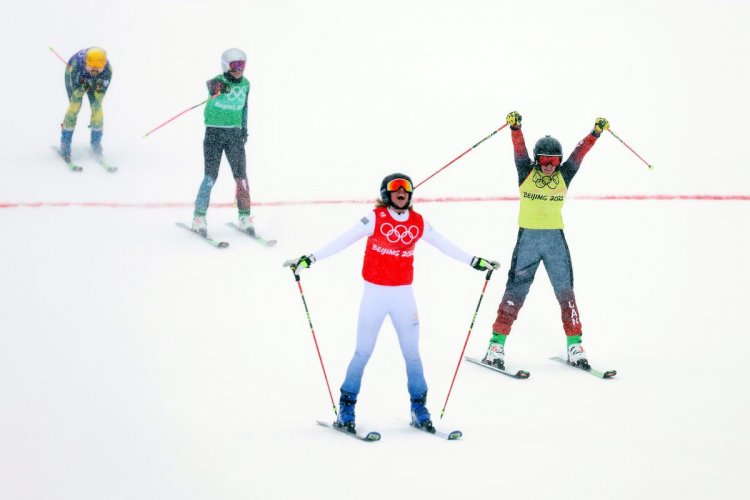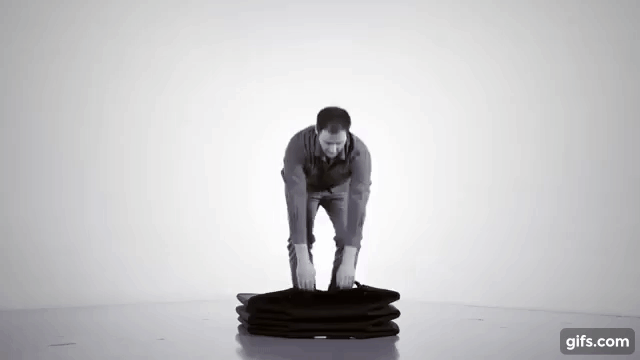Dave Feschuk: Canada’s Marielle Thompson keeps her Olympic calm to win ski cross silver
BEIJING Eight years ago, as Canada’s Marielle Thompson prepared to leave for Sochi to make her Olympic debut in ski cross, she got the feeling she was being peppered with the same question, over and over.“Are you nervous?” people would ask the 21-year-old.And Thompson said she would wonder: “Am I supposed to be?” Apparently, in some eyes, she was. The Olympics is the biggest stage in sports, after all. And she was young athlete from Whistler, B.C., who’d never before confronted its five-ringed heft.But then and now, one thing hasn’t changed about Thompson: She remains unafflicted by the disease of overthinking. Stack the real pressure of the Olympic moment with the undeniable danger of her event and Thompson just does what she always does. She competes like a demon, her laid-back West Coast vibe momentarily supplanted by a steely determination.“(Thompson) is just so calm,” a coach of hers once said. “I wish I had her nerves.”The calmness, more often than not, produces great results. Eight years ago in Sochi, Thompson won Olympic gold. On Thursday here, as a 29-year-old veteran of the game, she won silver.In a thrilling four-athlete big final in which Thompson got out of the gate slowly, the Canadian staged a furious charge down the stretch, gaining speed on a couple of key rollers before passing Switzerland’s Fanny Smith and Germany’s Danny Maier to claim second place. Maier was awarded the bronze medal after a lengthy review of her stretch-run tangle with Smith. Sweden’s Sandra Naeslund, who has dominated the World Cup circuit this season, won gold without incident.Considering she has battled an unenviable list of serious injuries during her career – she ruptured the anterior-cruciate ligament in her right knee for the second time last year – Thompson said she was “stoked” to secure a second career Olympic medal. Four years ago in Pyeongchang, Thompson was only a few months removed from the first surgical reconstruction of her right knee, a circumstance that brought her to the start line with almost no recent competition to speak of. She was eliminated in the first qualification race, but vowed to return better prepared.“I think having had such a disappointing Olympics in Pyeongchang, I knew that if I came into this Olympics prepared and as strong as I could be, I could do well,” she said. “I’m pretty happy. It’s pretty cool to be a two-time medallist at the Olympics.”In some ways, Thursday’s result was a step back for Canada. Naeslund became the first woman not wearing a Maple Leaf to win gold in the event, which made its inaugural appearance in the Games in 2010. That year, it was Ashleigh McIvor who claimed the gold – this while a young Thompson caught the bug as a spectator.“I was like ‘Wow, a Whistler girl won. I could do that,’” Thompson said.And after Thompson won gold in 2014, this with teammate Kelsey Serwa claiming silver, the Pyeonchang Games saw Canada finish one-two yet again, with Serwa standing on the top of the podium and Brittany Phelan on the silver step.If the medal haul wasn’t as impressive on Thursday, the event still spoke to Canada’s depth in the sport. Three of Thompson’s countrywomen advanced to the semifinals, with Phelan ultimately finishing fifth, Courtney Hoffos sixth and Hannah Schmidt seventh.“Having such strong teammates has made me a better racer,” Thompson said. “Even from the beginning, when I first made the national team in the fall of 2010, I really looked up to the women and chased them. And they made me the skier I am today. I think now I’m a little bit more of a leader on the team, and they are pushing me. So I have to be better, as well.”If she’s always pushing to be better, Thompson has never seemed to lose her gift for an uncanny calm. A lesser athlete might have pushed the proverbial panic button after getting out of the gate so slowly in the big final – “Not my best start, that’s for sure,” Thompson would later laugh – but Thompson was undeterred.“I knew being in fourth that if I was patient I could make up some time at the bottom of the track,” Thompson said.And after she made a strategic decision to stay close to the ground instead of jumping two key rollers near the bottom of the course, a strategy deployed by the athletes ahead of her, it turned out Thompson’s patience paid off.“It turned out I had a lot more speed and was able to make a double pass, which really exceeded expectations,” she said.While Naeslund was too far ahead to catch, Thompson found herself in the clear and in control for silver.“In ski cross it’s not really over until you cross the finish line,” she said. “So you’ve got to stick with it.”Dave Feschuk is a Toronto-based sports columnist for the Star. Follow him on Twitter: @dfeschuk


BEIJING Eight years ago, as Canada’s Marielle Thompson prepared to leave for Sochi to make her Olympic debut in ski cross, she got the feeling she was being peppered with the same question, over and over.
“Are you nervous?” people would ask the 21-year-old.
And Thompson said she would wonder: “Am I supposed to be?” Apparently, in some eyes, she was. The Olympics is the biggest stage in sports, after all. And she was young athlete from Whistler, B.C., who’d never before confronted its five-ringed heft.
But then and now, one thing hasn’t changed about Thompson: She remains unafflicted by the disease of overthinking. Stack the real pressure of the Olympic moment with the undeniable danger of her event and Thompson just does what she always does. She competes like a demon, her laid-back West Coast vibe momentarily supplanted by a steely determination.
“(Thompson) is just so calm,” a coach of hers once said. “I wish I had her nerves.”
The calmness, more often than not, produces great results. Eight years ago in Sochi, Thompson won Olympic gold. On Thursday here, as a 29-year-old veteran of the game, she won silver.
In a thrilling four-athlete big final in which Thompson got out of the gate slowly, the Canadian staged a furious charge down the stretch, gaining speed on a couple of key rollers before passing Switzerland’s Fanny Smith and Germany’s Danny Maier to claim second place. Maier was awarded the bronze medal after a lengthy review of her stretch-run tangle with Smith. Sweden’s Sandra Naeslund, who has dominated the World Cup circuit this season, won gold without incident.
Considering she has battled an unenviable list of serious injuries during her career – she ruptured the anterior-cruciate ligament in her right knee for the second time last year – Thompson said she was “stoked” to secure a second career Olympic medal. Four years ago in Pyeongchang, Thompson was only a few months removed from the first surgical reconstruction of her right knee, a circumstance that brought her to the start line with almost no recent competition to speak of. She was eliminated in the first qualification race, but vowed to return better prepared.
“I think having had such a disappointing Olympics in Pyeongchang, I knew that if I came into this Olympics prepared and as strong as I could be, I could do well,” she said. “I’m pretty happy. It’s pretty cool to be a two-time medallist at the Olympics.”
In some ways, Thursday’s result was a step back for Canada. Naeslund became the first woman not wearing a Maple Leaf to win gold in the event, which made its inaugural appearance in the Games in 2010. That year, it was Ashleigh McIvor who claimed the gold – this while a young Thompson caught the bug as a spectator.
“I was like ‘Wow, a Whistler girl won. I could do that,’” Thompson said.
And after Thompson won gold in 2014, this with teammate Kelsey Serwa claiming silver, the Pyeonchang Games saw Canada finish one-two yet again, with Serwa standing on the top of the podium and Brittany Phelan on the silver step.
If the medal haul wasn’t as impressive on Thursday, the event still spoke to Canada’s depth in the sport. Three of Thompson’s countrywomen advanced to the semifinals, with Phelan ultimately finishing fifth, Courtney Hoffos sixth and Hannah Schmidt seventh.
“Having such strong teammates has made me a better racer,” Thompson said. “Even from the beginning, when I first made the national team in the fall of 2010, I really looked up to the women and chased them. And they made me the skier I am today. I think now I’m a little bit more of a leader on the team, and they are pushing me. So I have to be better, as well.”
If she’s always pushing to be better, Thompson has never seemed to lose her gift for an uncanny calm. A lesser athlete might have pushed the proverbial panic button after getting out of the gate so slowly in the big final – “Not my best start, that’s for sure,” Thompson would later laugh – but Thompson was undeterred.
“I knew being in fourth that if I was patient I could make up some time at the bottom of the track,” Thompson said.
And after she made a strategic decision to stay close to the ground instead of jumping two key rollers near the bottom of the course, a strategy deployed by the athletes ahead of her, it turned out Thompson’s patience paid off.
“It turned out I had a lot more speed and was able to make a double pass, which really exceeded expectations,” she said.
While Naeslund was too far ahead to catch, Thompson found herself in the clear and in control for silver.
“In ski cross it’s not really over until you cross the finish line,” she said. “So you’ve got to stick with it.”
Dave Feschuk is a Toronto-based sports columnist for the Star. Follow him on Twitter: @dfeschuk















:quality(85):upscale()/2024/10/23/909/n/1922283/06a909b56719613ac8ce43.49146630_.png)




